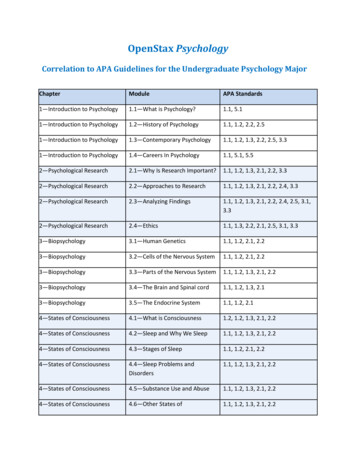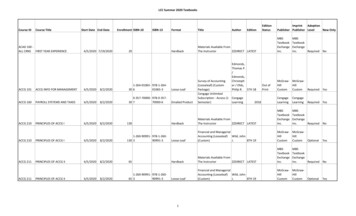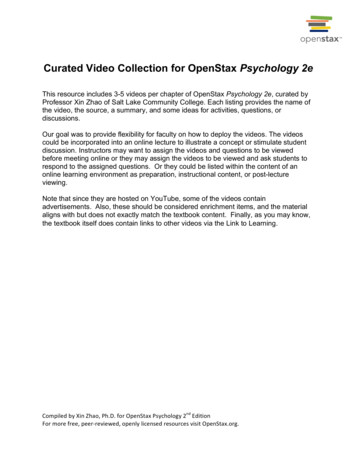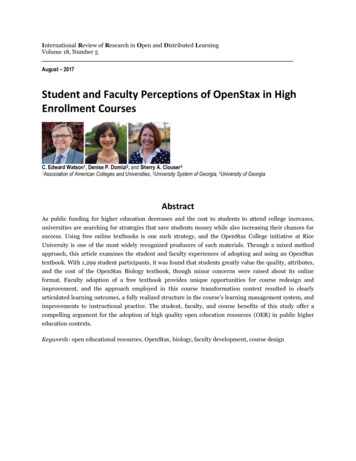
Transcription
OpenStax PsychologyCorrelation to APA Guidelines for the Undergraduate Psychology MajorChapterModuleAPA Standards1—Introduction to Psychology1.1—What is Psychology?1.1, 5.11—Introduction to Psychology1.2—History of Psychology1.1, 1.2, 2.2, 2.51—Introduction to Psychology1.3—Contemporary Psychology1.1, 1.2, 1.3, 2.2, 2.5, 3.31—Introduction to Psychology1.4—Careers In Psychology1.1, 5.1, 5.52—Psychological Research2.1—Why Is Research Important?1.1, 1.2, 1.3, 2.1, 2.2, 3.32—Psychological Research2.2—Approaches to Research1.1, 1.2, 1.3, 2.1, 2.2, 2.4, 3.32—Psychological Research2.3—Analyzing Findings1.1, 1.2, 1.3, 2.1, 2.2, 2.4, 2.5, 3.1,3.32—Psychological Research2.4—Ethics1.1, 1.3, 2.2, 2.1, 2.5, 3.1, 3.33—Biopsychology3.1—Human Genetics1.1, 1.2, 2.1, 2.23—Biopsychology3.2—Cells of the Nervous System1.1, 1.2, 2.1, 2.23—Biopsychology3.3—Parts of the Nervous System1.1, 1.2, 1.3, 2.1, 2.23—Biopsychology3.4—The Brain and Spinal cord1.1, 1.2, 1.3, 2.13—Biopsychology3.5—The Endocrine System1.1, 1.2, 2.14—States of Consciousness4.1—What is Consciousness1.2, 1.2, 1.3, 2.1, 2.24—States of Consciousness4.2—Sleep and Why We Sleep1.1, 1.2, 1.3, 2.1, 2.24—States of Consciousness4.3—Stages of Sleep1.1, 1.2, 2.1, 2.24—States of Consciousness4.4—Sleep Problems andDisorders1.1, 1.2, 1.3, 2.1, 2.24—States of Consciousness4.5—Substance Use and Abuse1.1, 1.2, 1.3, 2.1, 2.24—States of Consciousness4.6—Other States of1.1, 1.2, 1.3, 2.1, 2.2
Consciousness5—Sensation and Perception5.1—Sensation vs. Perception1.1, 1.2, 1.3, 2.1, 2.25—Sensation and Perception5.2—Waves, Wavelengths, andVision and Hearing1.1, 1.2, 1.3, 2.1, 2.25—Sensation and Perception5.3—Vision1.1, 1.2, 1.3, 2.1, 2.25—Sensation and Perception5.4—Hearing1.1, 1.2, 1.3, 2.1, 2.2, 2.55—Sensation and Perception5.5—The Other Senses1.1, 1.2, 1.3, 2.1, 2.25—Sensation and Perception5.6—Gestalt Principles ofPerception1.1, 1.2, 1.3, 1.4, 2.1, 2.2, 2.5, 3.36—Learning6.1—What is Learning?1.1, 1.2, 1.3, 2.1, 2.26—Learning6.2—Classical Conditioning1.1, 1.2, 1.3, 2.1, 2.26—Learning6.3—Operant Conditioning1.1, 1.2, 1.3, 2.1, 2.26—Learning6.4—Observational Learning(Modeling)1.1, 1.2, 1.3, 2.1, 2.2, 2.57—Thinking and Intelligence7.1—What is Cognition?1.1, 1.2, 1.3, 2.1, 2.27—Thinking and Intelligence7.2—Language1.1, 1.2, 1.3, 2.1, 2.2, 2.57—Thinking and Intelligence7.3—Problem Solving1.1, 1.2, 1.3, 2.1, 2.27—Thinking and Intelligence7.4—What Are Intelligence andCreativity?1.1, 1.2, 1.3, 2.1, 2.27—Thinking and Intelligence7.5—Measures of Intelligence1.1, 1.2, 1.3, 2.1, 2.2, 2.3, 2.5, 3.37—Thinking and Intelligence7.6—The Source of Intelligence1.1, 1.2, 1.3, 2.1, 2.28—Memory8.1—How Memory Functions1.1, 1.2, 1.3, 2.1, 2.28—Memory8.2—Parts of the Brain Involvedwith Memory1.1, 1.2, 1.3, 2.1, 2.28—Memory8.3—Problems with Memory1.1, 1.2, 1.3, 2.1, 2.2, 2.5, 3.18—Memory8.4—Ways to Enhance Memory1.1, 1.2, 1.3, 2.1, 2.2, 5.1
9—Lifespan Development9.1—What is LifespanDevelopment?1.1, 1.2, 1.3, 2.1, 2.2, 2.4, 2.5, 3.39—Lifespan Development9.2—Lifespan Theories1.1, 1.2, 1.3, 2.1, 2.29—Lifespan Development9.3—Stages of Development1.1, 1.2, 1.3, 2.1, 2.2, 2.59—Lifespan Development9.4—Death and Dying1.1, 1.2, 1.3, 2.1, 2.210—Motivation and Emotion10.1—Motivation1.1, 1.2, 1.3, 2.1, 2.210—Motivation and Emotion10.2—Hunger and Eating1.1, 1.2, 1.3, 2.1, 2.2, 2.510—Motivation and Emotion10.3—Sexual Behavior1.1, 1.2, 1.3, 2.1, 2.2, 2.5, 3.310—Motivation and Emotion10.4—Emotion1.1, 1.2, 1.3, 2.1, 2.2, 2.511—Personality11.1—What is Personality?1.1, 1.2, 1.3, 2.1, 2.211—Personality11.2—Freud and thePsychodynamic Perspective1.1, 1.2, 1.3, 2.1, 2.211—Personality11.3—Neo-Freudians: Adler,Erikson, Jung, and Horney1.1, 1.2, 1.3, 2.1, 2.211—Personality11.4—Learning Approaches1.1, 1.2, 1.3, 2.1, 2.211—Personality11.5—Humanistic Approaches1.1, 1.2, 1.3, 2.1, 2.211—Personality11.6—Biological Approaches1.1, 1.2, 1.3, 2.1, 2.211—Personality11.7—Trait Theorists1.1, 1.2, 1.3, 2.1, 2.211—Personality11.8—Cultural Understandings ofPersonality1.1, 1.2, 1.3, 2.1, 2.2, 2.511—Personality11.9—Personality Assessment1.1, 1.2, 1.3, 2.1, 2.2, 2.4, 2.512—Social Psychology12.1—What is Social Psychology?1.1, 1.2, 1.3, 2.1, 2.2, 2.5, 3.312—Social Psychology12.2—Self-presentation1.1, 1.2, 1.3, 2.1, 2.2, 3.112—Social Psychology12.3—Attitudes and Persuasion1.1, 1.2, 1.3, 2.1, 2.212—Social Psychology12.4—Conformity, Compliance,and Obedience1.1, 1.2, 1.3, 2.1, 2.2, 2.5, 3.1
12—Social Psychology12.5—Prejudice andDiscrimination1.1, 1.2, 1.3, 2.1, 2.2, 2.5, 3.1, 3.312—Social Psychology12.6—Aggression1.1, 1.2, 1.3, 2.1, 2.2, 3.312—Social Psychology12.7—Prosocial Behavior1.1, 1.2, 1.3, 2.1, What Is Industrial andOrganizational Psychology?1.1, 1.2, 1.3, 2.1, Industrial Psychology:Selecting and EvaluatingEmployees1.1, 1.2, 1.3, 2.1, 2.2, 3—Organizational Psychology:The Social Dimension of Work1.1, 1.2, 1.3, 2.1, 2.2, 3.3, 5.1, Human Factors Psychologyand Workplace Design1.1, 1.2, 1.3, 2.1, 2.214—Stress, Lifestyle, and Health 14.1—What is Stress?1.1, 1.2, 1.3, 2.1, 2.214—Stress, Lifestyle, and Health 14.2—Stressors1.1, 1.2, 1.3, 2.1, 2.2, 2.414—Stress, Lifestyle, and Health 14.3—Stress and Illness1.1, 1.2, 1.3, 2.1, 2.214—Stress, Lifestyle, and Health 14.4—Regulation of Stress1.1, 1.2, 1.3, 2.1, 2.2, 2.5, 3.314—Stress, Lifestyle, and Health 14.5—The Pursuit of Happiness1.1, 1.2, 1.3, 2.1, 2.2, 3.315—Psychological Disorders15.1—What Are PsychologicalDisorders?1.1, 1.2, 1.3, 2.1, 2.2, 2.5, 3.315—Psychological Disorders15.2—Diagnosing and ClassifyingPsychological Disorders1.1, 1.2, 1.3, 2.1, 2.2, 3.315—Psychological Disorders15.3—Perspectives onPsychological Disorders1.1, 1.2, 1.3, 2.1, 2.215—Psychological Disorders15.4—Anxiety Disorders1.1, 1.2, 1.3, 2.1, 2.215—Psychological Disorders15.5—Obsessive-Compulsive andRelated Disorders1.1, 1.2, 1.3, 2.1, 2.215—Psychological Disorders15.6—Posttraumatic StressDisorder1.1, 1.2, 1.3, 2.1, 2.2
15—Psychological Disorders15.7—Mood Disorders1.1, 1.2, 1.3, 2.1, 2.215—Psychological Disorders15.8—Schizophrenia1.1, 1.2, 1.3, 2.1, 2.215—Psychological Disorders15.9—Dissociative Disorders1.1, 1.2, 1.3, 2.1, 2.215—Psychological Disorders15.10—Personality Disorders1.1, 1.2, 1.3, ,2.1, 2.215—Psychological Disorders15.11—Disorders in Childhood1.1, 1.2, 1.3, 2.1, 2.2, 2.416—Therapy and Treatment16.1—Mental Health Treatment:Past and Present1.1, 1.2, 1.3, 2.1, 2.2, 3.316—Therapy and Treatment16.2—Types of Treatment1.1, 1.2, 1.3, 2.1, 2.216—Therapy and Treatment16.3—Treatment Modalities1.1, 1.2, 1.3, 2.1, 2.216—Therapy and Treatment16.4—Substance-Related andAddictive Disorders: A SpecialCase1.1, 1.2, 1.3, 2.1, 2.216—Therapy and Treatment16.5—The Sociocultural Modeland Therapy Utilization1.1, 1.2, 1.3, 2.1, 2.2, 2.5, 3.3Correlation to APA Guidelines for the Undergraduate Psychology Major(Source: American Psychological Association. (2013). APA guidelines for the undergraduate psychologymajor. Washington, DC: Author. Retrieved from delines.pdfThe APA Guidelines for the Undergraduate Psychology Major, Version 2.0American Psychological Association, May 15, 2013The Comprehensive Learning Goals and OutcomesGOAL 1. KNOWLEDGE BASE IN PSYCHOLOGYOverviewStudents should demonstrate fundamental knowledge and comprehension of the major concepts,theoretical perspectives, historical trends, and empirical findings to discuss how psychological principlesapply to behavioral phenomena. Students completing Foundation courses should demonstrate breadthof their knowledge and application of psychological ideas to simple problems; students completing abaccalaureate degree should show depth in their knowledge and application of psychological conceptsand frameworks to problems of greater complexity.
OutcomesStudents will:1.1 Describe key concepts,principles, and overarchingthemes in psychologyFoundation IndicatorsStudents will:1.1a Use basic psychologicalterminology, concepts, andtheories in psychology to explainbehavior and mental processes1.1b Explain why psychology is ascience, with the primaryobjectives of describing,understanding, predicting, andcontrolling behavior and mentalprocesses1.1c Interpret behavior andmental processes at anappropriate level of complexity1.1d Recognize the power of thecontext in shaping conclusionsabout individual behavior1.1e Identify fields other thanpsychology that addressbehavioral concernsOutcomesStudents will:1.2 Develop a workingknowledge of psychology’scontent domainsFoundation IndicatorsStudents will:1.2a Identify key characteristicsof major content domains inpsychology (e.g., cognition andlearning, developmental,biological, and sociocultural)1.2b Identify principal methodsand types of questions thatemerge in specific contentdomains1.2c Recognize major historicalevents, theoretical perspectives,and figures in psychology andtheir link to trends incontemporary researchBaccalaureate IndicatorsStudents will:1.1A Use and evaluate theoriesto explain and predict behavior,including advantages andlimitations in the selectedframeworks1.1B Describe the complexity ofthe persistent questions thatoccupy psychologists’ attention1.1C Analyze the variability andcontinuity of behavior andmental processes within andacross animal species1.1D Examine the socioculturaland international contexts thatinfluence individual differences(e.g., personality traits, abilities)and address applicability ofresearch findings across societaland cultural groups1.1E Compare and contrast thenature of psychology with otherdisciplines (e.g., biology,economics, political science),including the potentialcontribution of psychology tointerdisciplinary collaborationBaccalaureate IndicatorsStudents will:1.2A Compare and contrastpsychology’s majorsubdisciplines1.2B Speculate about whycontent domains differ in thekinds of questions asked and themethods used to explore them1.2C Summarize importantaspects of history of psychology,including key figures, centralconcerns, methods used, andtheoretical conflicts
1.2d Provide examples of uniquecontributions of content domainto the understanding of complexbehavioral issues1.2e Recognize content domainsas having distinctivesociocultural origins anddevelopmentOutcomesStudents will be able to:1.3 Describe applications ofpsychologyFoundation IndicatorsStudents will be able to:1.3a Describe examples ofrelevant and practicalapplications of psychologicalprinciples to everyday life1.3b Summarize psychologicalfactors that can influence thepursuit of a healthy lifestyle1.3c Correctly identifyantecedents and consequencesof behavior and mentalprocesses1.3d Predict how individualdifferences influence beliefs,values, and interactions withothers, including the potentialfor prejudicial and discriminatorybehavior in oneself and othersGOAL 2.1.2D Explain complex behaviorby integrating conceptsdeveloped from differentcontent domains1.2E Predict how socioculturaland international factorsinfluence how scientists thinkabout behavioral and mentalprocessesBaccalaureate IndicatorsStudents will be able to:1.3A Articulate howpsychological principles can beused to explain social issues,addressing pressing societalneeds, and inform public policy1.3B Evaluate how the mind andbody interact to influencepsychological and physical health1.3C Propose and justifyappropriate psychology-basedinterventions in applied settings(e.g., clinical, school, community,or industrial settings)1.3D Explain how psychologicalconstructs can be used tounderstand and resolveinterpersonal and interculturalconflictsSCIENTIFIC INQUIRY AND CRITICAL THINKINGOverviewThe skills in this domain involve the development of scientific reasoning and problem solving, includingeffective research methods. Students completing Foundation-level courses should learn basic skills andconcepts in interpreting behavior, studying research, and applying research design principles to drawingconclusions about behavior; students completing a baccalaureate degree should focus on theory use aswell as designing and executing research plans.OutcomesStudents will:Foundation IndicatorsStudents will:Baccalaureate IndicatorsStudents will:
2.1 Use scientificreasoning to interpretpsychologicalphenomenaOutcomesStudents will:2.2 Demonstratepsychologyinformation literacy2.1a Identify basic biological,psychological, and social componentsof psychological explanations (e.g.,inferences, observations, operationaldefinitions, interpretations)2.1b Use psychology concepts toexplain personal experiences andrecognize the potential for flaws inbehavioral explanations based onsimplistic, personal theories2.1c Use an appropriate level ofcomplexity to interpret behavior andmental processes2.1d Ask relevant questions to gathermore information about behavioralclaims2.1e Describe common fallacies inthinking (e.g., confirmation bias, posthoc explanations, implying causationfrom correlation) that impair accurateconclusions and predictionsFoundation IndicatorsStudents will:2.2a Read and summarize generalideas and conclusions frompsychological sources accurately2.2b Describe what kinds of additionalinformation beyond personalexperience are acceptable indeveloping behavioral explanations(i.e., popular press reports vs.scientific findings)2.2c Identify and navigate psychologydatabases and other legitimatesources of psychology information2.2d Articulate criteria for identifyingobjective sources of psychologyinformation2.1A Describe the value andlimitation of using theories toexplain behavioral phenomena2.1B Develop plausible behavioralexplanations that rely on scientificreasoning and evidence rather thananecdotes or pseudoscience2.1C Incorporate several appropriatelevels of complexity (e.g. cellular,individual, group/system,societal/cultural) to explain behavior2.1D Generate alternativeexplanations based on perceivedflaws in behavioral claims2.1E Use strategies to minimizecommitting common fallacies inthinking that impair accurateconclusions and predictionsBaccalaureate IndicatorsStudents will:2.2A Read and summarize complexideas accurately, including futuredirections, from psychologicalsources and research2.2B Describe the characteristics andrelative value of differentinformation sources (e.g., primaryvs. secondary, peer reviewer vs.nonreviewed, empirical vs.nonempirical)2.2C Develop a comprehensivestrategy for locating and usingrelevant scholarship (e.g., databases,credible journals) to addresspsychological questions2.2D Evaluate psychologyinformation based on the reliability,validity, and generalizability ofsources
2.2e Interpret simple graphs andstatistical findingsOutcomesStudents will:2.3 Engage ininnovative andintegrative thinkingand problem solvingOutcomesStudents will:2.4 Interpret, design,and conduct basicpsychological researchFoundation IndicatorsStudents will:2.3a Recognize and describe welldefined problems2.2E Interpret complex statisticalfindings and graphs in the context oftheir level of statistical significance,including the influence of effect size,and explain these findings using laylanguageBaccalaureate IndicatorsStudents will:2.3A Describe problemsoperationally to study themempirically2.3b Apply simple problem-solvingstrategies to improve efficiency andeffectiveness2.3c Describe the consequences ofproblem-solving attemptsFoundation IndicatorsStudents will:2.4a Describe research methods usedby psychologists including theirrespective advantages anddisadvantages2.3B Select and apply the optimalproblem-solving strategy frommultiple alternatives2.3C Evaluate the effectiveness ofselected problem-solving strategiesBaccalaureate IndicatorsStudents will:2.4A Evaluate the effectiveness of aquantitative and qualitative researchmethods in addressing a researchquestion2.4b Discuss the value of experimentaldesign (i.e., controlled comparisons) injustifying cause effect relationships2.4B Limit cause effect claims toresearch strategies thatappropriately rule out alternativeexplanations2.4C Accurately identify key researchconcepts in existing and proposedresearch projects2.4c Define and explain the purpose ofkey research concepts thatcharacterize psychological research(e.g., hypothesis, operationaldefinition)2.4d Replicate or design and conductsimple scientific studies (e.g.,correlational or two-factor) to confirma hypothesis based on operationaldefinitions2.4e Explain why conclusions inpsychological projects must be bothreliable and valid2.4f Explain why quantitative analysisis relevant for scientific problemsolving2.4D Design and conduct complexstudies to confirm a hypothesisbased on operational definitions2.4E Design and adopt high-qualitymeasurement strategies thatenhance reliability and validity2.4F Use quantitative and/orqualitative analyses to argue for oragainst a particular hypothesis
2.4g Describe the fundamentalprinciples of research designOutcomesStudents will:2.5 Incorporatesociocultural factors inscientific inquiryFoundation IndicatorsStudents will:2.5a Relate examples of how aresearcher’s value system,sociocultural characteristics, andhistorical context influence thedevelopment of scientific inquiry onpsychological questions2.5b Analyze potential challengesrelated to sociocultural factors in agiven research study2.5c Describe how individual andsociocultural differences can influencethe applicability/generalizability ofresearch findings2.5d Identify under what conditionsresearch findings can be appropriatelygeneralizedGOAL 3.2.4G Apply knowledge of researchskills necessary to be an informedconsumer of research or criticregarding unsupported claims aboutbehaviorBaccalaureate IndicatorsStudents will:2.5A Recognize the systemicinfluences of sociocultural,theoretical, and personal biases onthe research enterprise and evaluatethe effectiveness with whichresearchers address those influencesin psychological research2.5B Design studies that effectivelyaddress the effects of socioculturalfactors2.5C Evaluate and design researchwith respect to controls forvariations in behavior related toindividual and socioculturaldifferences that can influenceresearch outcomes2.5D Evaluate the generalizability ofspecific findings based onparameters of the research design,including caution in extendingwestern constructs inappropriatelyETHICAL AND SOCIAL RESPONSIBILITY IN ADIVERSE WORLDOverviewThe skills in this domain involve the development of ethically and socially responsible behaviors forprofessional and personal settings in a landscape that involves increasing diversity. Students completingFoundation-level courses should become familiar with the formal regulations that govern professionalethics in psychology and begin to embrace the values that will contribute to positive outcomes in worksettings and in building a society responsive to multicultural and global concerns. Students completing abaccalaureate degree should have more direct opportunities to demonstrate adherence to professionalvalues that will help them optimize their contributions and work effectively even with those who don’tshare their heritage and traditions. This domain also promotes the adoption of personal and professionalvalues that can strengthen community relationships and contributions.
OutcomesStudents will:3.1 Apply ethicalstandards to evaluatepsychological scienceand practiceFoundation IndicatorsStudents will:3.1a Describe key regulations inthe APA Ethics Code forprotection of human ornonhuman research participants3.1b Identify obvious violationsof ethical standards inpsychological contexts3.1c Discuss relevant ethicalissues that reflect principles inthe APA Ethics Code3.1d Define the role of theinstitutional review boardOutcomesStudents will:3.2 Build and enhanceinterpersonalrelationshipsOutcomesStudents will:3.3 Adopt values thatbuild community atlocal, national, andglobal levelsFoundation IndicatorsStudents will:3.2a Describe the need forpositive personal values (e.g.,integrity, benevolence, honesty,respect for human dignity) inbuilding strong relationshipswith others3.2b Treat others with civility3.2c Explain how individualdifferences, social identity, andworldview may influence beliefs,values, and interaction withothers and vice versa3.2d Maintain high standards foracademic integrity, includinghonor code requirementsFoundation IndicatorsStudents will:3.3a Identify aspects ofindividual and cultural diversityand the interpersonal challengesthat often result from diversityand context3.3b Recognize potential forprejudice and discrimination inoneself and othersBaccalaureate IndicatorsStudents will:3.1A Evaluate psychological research fromthe standpoint of adherence to the APAEthics Code in psychological researchinvolving human or nonhuman researchparticipants3.1B Justify recommendations forconsequences for ethical violations basedon APA Ethics Code requirements3.1C Explain how the APA Ethics Code canbe used to guide decisions in ethicallycomplex situations3.1D Critically evaluate or complete an IRBapplication that adheres to ethicalstandardsBaccalaureate IndicatorsStudents will:3.2A Exhibit high standards of positivepersonal values in interpersonal and workrelated relationships3.2B Promote civility in self and others3.2C Predict and explore how interactionacross racial, ethnic, gender, and classdivides can challenge conventionalunderstanding of psychological processesand behavior3.2D Describe, explain, and upholdacademic integrity within the context ofpsychology as a discipline and anacademic professionBaccalaureate IndicatorsStudents will:3.3A Exhibit respect for members ofdiverse groups with sensitivity to issues ofpower, privilege, and discrimination3.3B Develop psychology-based strategiesto facilitate social change to diminishdiscrimination practices
3.3c Explain how psychology canpromote civic, social, and globaloutcomes that benefit others3.3C Pursue personal opportunities topromote civic, social, and global outcomesthat benefit the community3.3d Describe psychologyrelated issues of global concern(e.g., poverty, health, migration,human rights, rights of children,international conflict,sustainability)3.3e Articulate psychology’s rolein developing, designing, anddisseminating public policy3.3D Consider the potential effects ofpsychology-based interventions on issuesof global concern3.3f Accept opportunity to serveothers through civicengagement, includingvolunteer serviceGOAL 4.3.3E Apply psychological principles to apublic policy issue and describe theanticipated institutional benefit or societalchange3.3F Seek opportunity to serve othersthrough volunteer service, practica, andapprenticeship experiencesCOMMUNICATIONOverviewStudents should demonstrate competence in writing, oral, and interpersonal communication skills.Students completing Foundation-level courses should be able to write a cogent scientific argument,present information using a scientific approach, engage in discussion of psychological concepts, explainthe ideas of others, and express their own ideas with clarity. Students completing a baccalaureate degreeshould produce a research study or other psychological project, explain scientific results, and presentinformation to a professional audience. They should also develop flexible interpersonal approaches thatoptimize information exchange and relationship development.OutcomesStudents will:4.1 Demonstrateeffective writing fordifferent purposesFoundation IndicatorsStudents will:4.1a Express ideas in written formatsthat reflect basic psychologicalconcepts and principles4.1b Recognize writing content andformat differ based on purpose (e.g.,blogs, memos, journal articles) andaudience4.1c Use standard English, includinggenerally accepted grammar4.1d Write using APA styleBaccalaureate IndicatorsStudents will:4.1A Construct arguments clearlyand concisely based on evidencebased psychological concepts andtheories4.1B Craft clear and concise writtencommunications to address specificaudiences (e.g., lay, peer,professional)4.1C Use grammar appropriate toprofessional standards andconventions (e.g., APA writing style)4.1D Employ APA writing style tomake precise and persuasive
4.1e Recognize and develop overallorganization (e.g., beginning,development, ending) that fits thepurpose4.1f Interpret quantitative datadisplayed in statistics, graphs, andtables, including statistical symbolsin research reports4.1g Use expert feedback to revisewriting of a single draftOutcomesStudents will:4.2 Exhibit effectivepresentation skills fordifferent purposesOutcomesStudents will:4.3 Interact effectivelywith othersFoundational IndicatorsStudents will:4.2a Construct plausible oralargument based on a psychologicalstudy4.2b Deliver brief presentationswithin appropriate constraints (e.g.,time limit, appropriate to audience)4.2c Describe effective deliverycharacteristics of professional oralperformance4.2d Incorporate appropriate visualsupport4.2e Pose questions aboutpsychological contentFoundation IndicatorsStudents will:4.3a Identify key message elementsin communication through carefullistening4.3b Recognize that culture, values,and biases may producemisunderstandings incommunication4.3c Attend to language andnonverbal cues to interpret meaning4.3d Ask questions to captureadditional detail4.3e Respond appropriately toelectronic communicationsGOAL 5.PROFESSIONAL DEVELOPMENTarguments4.1E Tailor length and developmentof ideas in formats that fit thepurpose4.1F Communicate quantitative datain statistics, graphs, and tables4.1G Seek feedback to improvewriting quality resulting in multipledraftsBaccalaureate IndicatorsStudents will:4.2A Create coherent and integratedoral argument based on a review ofthe pertinent psychologicalliterature4.2B Deliver complex presentationswithin appropriate constraints (e.g.,time limit, appropriate to audience)4.2C Achieve effective deliverystandards in professional oralperformance4.2D Integrate visual and oralelements4.2E Anticipate answers to questionsabout psychological contentBaccalaureate IndicatorsStudents will:4.3A Show capacity for listening anddecoding both overt and covertmessages4.3B Deploy psychological conceptsto facilitate effective interactionswith people of diverse backgrounds4.3C Interact sensitively with peopleof diverse abilities, backgrounds,and cultural perspectives4.3D Generate questions to reduceambiguous communications4.3E Use social media responsibly
OverviewThe emphasis in this goal is on application of psychology-specific content and skills, effective selfreflection, project-management skills, teamwork skills, and career preparation. Foundation outcomesconcentrate on the development of work habits and ethics to succeed in academic settings. The skills inthis goal at the Baccalaureate level refer to abilities that sharpen student readiness forpostbaccalaureate employment, graduate school, or professional school. These skills can be developedand refined both in traditional academic settings and extracurricular involvement. In addition, careerprofessionals can be enlisted to support occupational planning and pursuit. This emerging emphasisshould not be construed as obligating psychology programs to obtain employment for their graduates,but instead encourage programs to optimize the competitiveness of their graduates for securing placesin the workforce.OutcomesStudents will:5.1 Apply psychologicalcontent and skills tocareer goalsFoundation IndicatorsStudents will:5.1a Recognize the value andapplication of research and problemsolving skills in providing evidencebeyond personal opinion to supportproposed solutions5.1b Identify range of possiblefactors that influence beliefs andconclusions5.1c Expect to deal with differingopinions and personalities in thecollege environment5.1d Describe how psychology’scontent applies to business, healthcare, educational, and otherworkplace settings5.1e Recognize and describe broadapplications of information literacyskills obtained in the psychologymajor5.1f Describe how ethical principlesof psychology have relevance tononpsychology settingsOutcomesStudents will:5.2 Exhibit self-efficacyand self-regulationFoundation IndicatorsStudents will:5.2a Recognize the link betweenefforts in self-management andachievementBaccalaureate IndicatorsStudents will:5.1A Describe and execute problemsolving and research methods tofacilitate effective workplacesolutions5.1B Disregard or challenge flawedsources of information5.1C Expect and adapt to interactioncomplexity, including factors relatedto diversity of backgrounds, in workorganizations5.1D Apply relevant psychologycontent knowledge to facilitate amore effective workplace ininternships, jobs, or organizationalleadership opportunities5.1E Adapt information literacy skillsobtained in the psychology major toinvestigating solutions to a variety ofproblem solutions5.1F Apply the ethical principles ofpsychologists to nonpsychologyprofessional settingsBaccalaureate IndicatorsStudents will:5.2A Design deliberate efforts toproduce desired self-managementoutcomes (e.g., self-regulation,hardiness, resilience)
5.2b Accurately self-assessperformance quality by adhering toexternal standards (e.g., rubriccriteria, teacher expectations)5.2c Incorporate feedback fromeducators and mentors to changeperformance5.2d Describe self-regulationstrategies (e.g., reflection, timemanagement)OutcomesStudents will:5.3 Refine projectmanagement skillsFoundation IndicatorsStudents will:5.3a Follow instructions, includingtimely delivery, in response toproject criteria5.3b Identify appropriate resourcesand constraints that may influenceproject completion5.3c Anticipate where potentialproblems can hinder successfulproject completionOutcomesStudents will:5.4 Enhance teamworkcapacity5.3d Describe the processes andstrategies necessary to develop aproject to fulfill its intended purposeFoundation IndicatorsStudents will:5.4a Collab
OpenStax Psychology Correlation to APA Guidelines for the Undergraduate Psychology Major Chapter Module APA Standards 1—Introduction to Psychology 1.1—What is Psychology?










